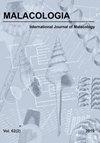Species of Iothia (Gastropoda: Lepetidae) from Shallow Waters of the Magellan Region
IF 0.7
4区 生物学
Q4 ZOOLOGY
引用次数: 2
Abstract
ABSTRACT The Lepetidae are currently assumed to be represented by only one valid species in the Magellan region: Iothia emarginuloides (Philippi, 1868), of which Tectura (Pilidium) coppingeri Smith, 1881, and Iothia coppingeri magellanica Linse, 2002, were regarded as synonyms. The extant records of this species are scarce, although they suggest a wide distributional range in the Pacific Ocean, from off Concepción (36°S) to the Beagle Channel (55°S), and a restricted distribution in the Atlantic Ocean, where the species is only known from the Malvinas / Falkland Islands and Isla de los Estados (about 54.5°S). This study provides new information on the occurrence of the genus Iothia in the Magellan region, including morphological, anatomical and molecular evidence. The synonymy of Tectura (Pilidium) coppingeri, Iothia coppingeri magellanica and Iothia emarginuloides is ratified. The species is properly redescribed and figured, and its intraspecific variability discussed, particularly regarding its relation with depths. Furthermore, the distribution of this species in the southwestern Atlantic is extended north to San Matías Gulf (about 41°S). Iothia megalodon Warén, Nakano & Sellanes, 2011, previously known from deep waters off Concepción (36°S), is here reported for the first time for the Magellan region. Its finding in shallow waters from the Beagle Channel greatly extends its distribution both latitudinally and bathymetrically.标题麦哲伦地区浅水区棘足虫属(腹足目:棘足虫科)
目前认为麦哲伦地区只有一个有效的种代表Lepetidae: Iothia emarginuloides (Philippi, 1868),其中Tectura (Pilidium) coppingeri Smith, 1881和Iothia coppingeri magellanica Linse, 2002被认为是同义词。该物种的现存记录很少,尽管它们表明在太平洋的广泛分布范围,从Concepción(36°S)到Beagle海峡(55°S),以及在大西洋的有限分布,该物种仅在马尔维纳斯群岛/福克兰群岛和Isla de los Estados(约54.5°S)被发现。该研究提供了麦哲伦地区存在的新信息,包括形态、解剖和分子证据。确认了黄竹、麦哲伦黄竹和艾草的同义性。该物种被适当地重新描述和描绘,并讨论了其种内变异性,特别是关于其与深度的关系。此外,本种在西南大西洋的分布向北延伸至圣Matías湾(约41°S)。Iothia megalodon war, Nakano & Sellanes, 2011年,以前在Concepción(36°S)的深水中发现,这是麦哲伦地区首次报道。它在比格尔海峡浅水区的发现大大扩展了它在纬度和水深上的分布。
本文章由计算机程序翻译,如有差异,请以英文原文为准。
求助全文
约1分钟内获得全文
求助全文
来源期刊

Malacologia
生物-动物学
CiteScore
2.00
自引率
0.00%
发文量
15
审稿时长
3 months
期刊介绍:
Malacologia publishes papers on all groups of the Mollusca. Malacologia specializes in publishing long papers and monographic treatments. Complete data are especially appreciated. Papers must be of interest to an international readership. Papers in systematics, ecology, population ecology, genetics, molecular genetics, evolution and phylogenetic treatments are especially welcomed. Also welcomed are letters to the editor involving papers published or issues of import to science of the day.
 求助内容:
求助内容: 应助结果提醒方式:
应助结果提醒方式:


